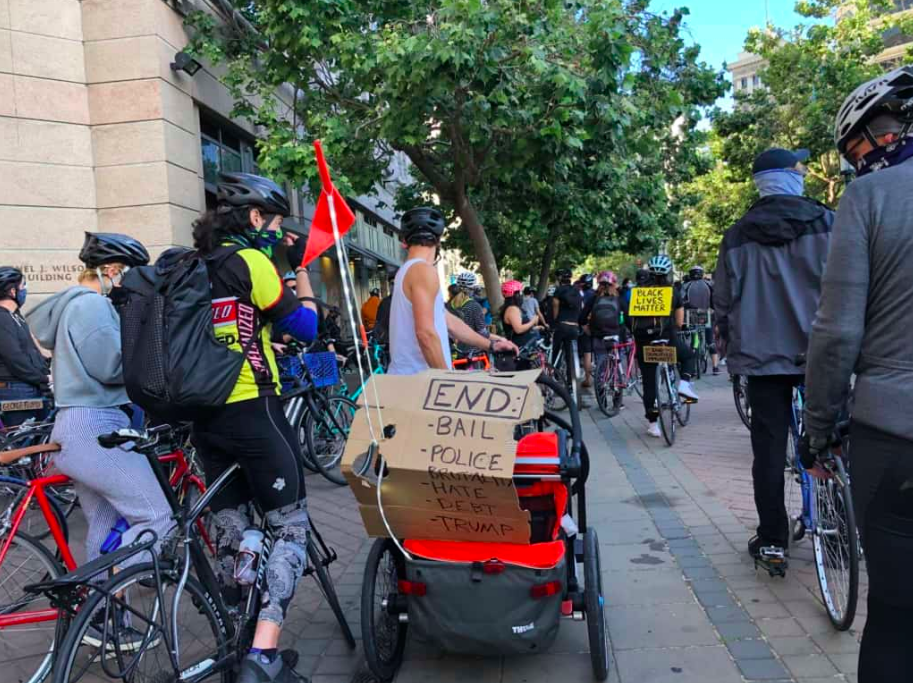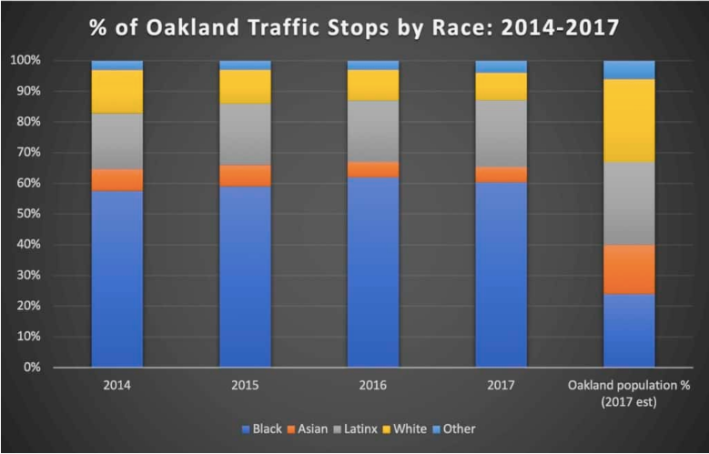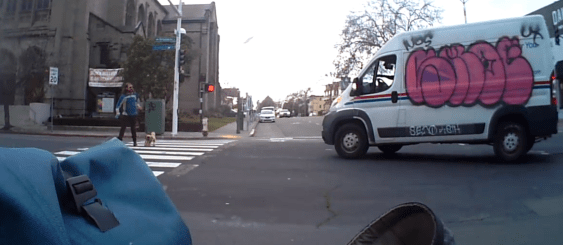As calls to "defund the police" grow louder across the country, the California Bicycle Coalition has posted an excellent discussion of the issue, including a list of recommended policies. These policies, which include ways to shrink existing police departments while maintaining public safety and offering more resources to distressed communities, could dramatically change the way cities think about public safety.
Most activists that have rallied behind calls to Defund the Police are not calling for the total abolishment of police departments, and traffic safety advocates are no exception. Instead, Calbike calls for redirecting police budgets towards people doing the community work that helps prevent problems in the first place, such as social workers, homeless advocates, and healthcare providers.
CalBike reiterates that traffic stops are where most people are likely to come into contact with the police, and that data from police departments throughout the nation show large racial disparities in traffic stops and in police use of force. One analysis found that police were more likely to use force against unarmed Black people and much more likely to kill Black people who aren’t resisting arrest.
The racial profiling in traffic stops includes people on bikes and on foot. Bike East Bay compiled the numbers in the chart below, about stops in the city of Oakland
Writes CalBike:
No one should be harassed for biking or walking while Black. No one should be threatened with police violence for using shared public space. Enforcement of traffic laws by armed police is not working to create safe streets. In fact, it is downright dangerous to Black, indigenous, and people of color.
CalBike offers six recommendations to help guide state policy changes that, they say, will shift traffic enforcement in an anti-racist direction. They are:
- Redirect funding from the California Highway Patrol budget to street redesign. That is, invest in street design - like protected bike lanes - that can be "self-enforcing."
While infrastructure changes have a high up-front cost, they are much less expensive over time than policing. Safer infrastructure is operational 24/7 and doesn’t require staffing. Better yet, protected bike lanes and intersections have no racial bias – they are equally safe for everyone.
- Redirect funding from the CHP to automated enforcement. Efforts to legalize automated enforcement, such as speed cameras, have been met with strong objections from police lobbyists, who have been powerful players in the legislative arena. This, despite their known efficacy:
Studies show that automated speed cameras can reduce speeds by up to fifteen percent and serious car crashes by up to 44 percent.
- Divert Office of Traffic Safety (OTS) funding from police departments to community efforts. Currently OTS grants are used by police departments to conduct "safety enforcement campaigns," but those campaigns tend to be vague in focus and lacking in measurable outcomes--except for numbers of tickets written. Traffic cops still equate more tickets with more safety. Even in "bicycle-friendly" Berkeley, police have used OTS grants to ticket bicyclists who don't come to a dead stop at stop signs on quiet traffic-free streets - a most counterproductive effort.
Traffic enforcement should target the vehicles that cause the most harm: cars and trucks. In addition, people who walk and bike have to contend with a hostile built environment that often doesn’t serve them. What the police see as violations are often merely bike riders making their best choices about how to get around on poorly designed streets.
- Decriminalize biking and walking. Unnecessary enforcement actions that do little to increase public safety include ticketing bicyclists for running stop signs, citing - and arresting - people for jaywalking, and ticketing youth for riding a bike without a helmet.
- Make public transportation, including bike and scooter share, free.
Tickets for fare evasion are most likely to be given to the people who have the least means to pay. Transit police often target Black riders for extra scrutiny... The money saved on transit policing will help make free transit more affordable.
- Implement income-adjusted traffic fines.
A $200 red-light ticket could take food off the table of a minimum wage worker, but amount to spare change for a wealthy person. Traffic fines reinforce cycles of poverty and discrimination, often leading to harsher penalties and late fees for poor people who can’t afford to pay. No one should go hungry or go to jail because of a traffic violation.
CalBike is claiming no credit for creating these policy recommendations, but is committing to working on them. The recommendations are based on years of work done by community leaders and activists, including Black and brown urbanists like Tamika Butler, who have been speaking out about racism in planning and policing for years.
See CalBike's post here.







